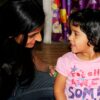Author Archive: Poland - Czym skorupka

Why is it important to have good memories from the ECEC setting?
What is your earliest memory? One of the first ones I have is of my caregiver from crèche holding me in her arms and cradling in the rocking chair because my jaw hurt a lot (I think my teeth were coming out, I don’t know if they were the first ones…). Dr. Carole Peterson, University…
Read more
Screen time for the youngest? No!
Watching TV (and even playing when the TV is turned on in the background!) before the age of 18 months can have a negative impact on a child’s speech development, reading skills (in the future) or short-term memory. It is also related to sleep and attention problems. The Canadian Paediatric Society recommends that young children…
Read more
Let’s go out: No more excuses to stay indoors!
All seasons are appropriate for children to spend time outside. However, spring, usually characterized by friendly weather (not too cold and not too hot), as well as interesting changes in the environment (growing and blooming plants), and the fact that it follows the short winter days, seems to be perfect to provide children with unique…
Read more
When is praising children effective?
Anna is a shy four-year-old girl with low self-esteem. Today during morning circle time, she volunteered to mark the weather on the weather board for the first time. Her teacher was so happy that she praised her with a lot of positive feedback (“You are such a brave girl to volunteer”, “You are so perceptive,…
Read more
About intense emotions and self-control in small children
Two-year-old Stefania refuses to put on her new shoes. She is definitely calling out: not mine! And she escapes to the farthest corner of the classroom. She is screaming, crying, stamping her legs. The teacher tries to get closer to the girl. Stefania pulls out her hands as if she wanted to hug herself, but…
Read more
Effective cooperation with families – how to prepare the “ground” for it?
Stephanie’s mother is frustrated. She was talking to her daughter on their way home from the setting and learned that the children spent the whole day playing. This is the third day in a row when Stephanie ‘hasn’t learnt’ at all! How does this relate to the teacher’s assurances that children learn something new every…
Read more
When patience hangs in the balance…
This blog post was contributed by Marta Kotarba (Maria Grzegorzewska University). Patience is necessary for teachers not only to provide high quality provision but also to protect their own mental health. Empathy, the ability to take care of oneself and to take different perspectives into account when deciding how to react to a frustrating situation helps to…
Read more
Closeness in the isolation era – 5 practical tips
This blog post was contributed by Olga Wysłowska (University of Warsaw). Modern research clearly shows that close and warm relationships between children and educators are the most important condition for optimal development of children [1]. However, the question is how to ensure that children, especially the youngest ones feel comfortable and safe in the setting after…
Read more
A child’s brain needs love
Hugs, lullabies, a gentle touch and the smile of caregivers can provide an excellent vaccine for future broken hearts, teenage anxiety and it can even help to pass an important exam several decades later. Evidence from a new branch of science called epigenetics* shows that such a long-term emotional vaccination is actually possible! Early infant…
Read more
Men in early childhood education – opportunity or threat?
This blog post was contributed by Gracjana Woźniak (Comenius Institute). Do young children really need male caregivers? Or perhaps men pose a threat to children? I am lucky to work in an institution where many men are employed – educators, group assistants, speech language pathologist, disabled children’s assistants. Children adore Mr. Franco, who hugs those…
Read more